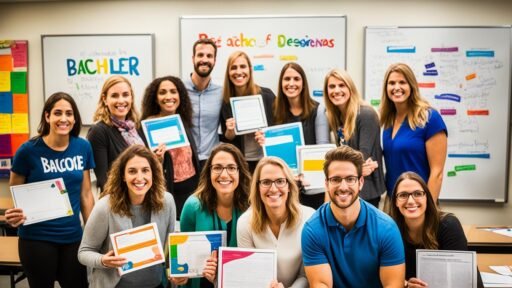General education requirements are an integral part of earning a bachelor’s degree. These requirements ensure that students graduate with a strong academic foundation and a well-rounded education that extends beyond their major. By understanding how to navigate and fulfill general education requirements, students can maximize their college experience and set themselves up for future success.
Colleges often refer to general education requirements as the “college’s core curriculum.” These courses cover a range of subjects, including arts and humanities, mathematics and science, English language and literature, history, and social sciences. The purpose of these requirements is to provide students with a diversified education that fosters critical thinking, problem-solving, and a broader understanding of the world.
Also Read: Masters In Special Education: Advance Your Skills
Key Takeaways:
- General education requirements are an essential component of earning a bachelor’s degree.
- They ensure students graduate with a strong academic foundation and a well-rounded education outside their major.
- Navigating and fulfilling general education requirements helps maximize the college experience.
- The core curriculum covers various subjects and promotes critical thinking and problem-solving skills.
- Understanding the importance of general education requirements sets students up for future success.
Why Do Students Have to Take General Education Courses?
General education courses are a mandatory component of bachelor’s degree programs, serving a crucial purpose in education. These courses are designed to promote interdisciplinary education, critical thinking, and a well-rounded academic experience. While some students may question the necessity of these requirements, colleges have adopted general education courses to strike a balance between vocational training and a liberal education.
Also Read: Career Education Systems: Elevate Your Career
In today’s rapidly evolving world, employers seek graduates who possess not only specialized knowledge but also a broader understanding of various subjects and the ability to think critically. General education courses provide students with the opportunity to explore different disciplines outside their major, enabling them to develop a diverse skill set and gain a deeper appreciation for the interconnectedness of knowledge.
“General education courses bridge the gap between specialized training and a comprehensive education. They foster critical thinking skills and promote the development of transferable abilities that are invaluable in any career.”
Interdisciplinary Education and Critical Thinking
General education courses encourage interdisciplinary education by exposing students to different fields of study. They challenge students to think beyond their chosen major, encouraging them to make connections and explore various perspectives. This interdisciplinary approach cultivates critical thinking skills as students learn to evaluate information, analyze complex problems, and develop well-reasoned arguments.
By engaging in interdisciplinary education, students are better prepared to tackle real-world challenges that often require creative problem-solving and the ability to draw upon multiple areas of knowledge. This holistic approach to education not only prepares students for their chosen careers but equips them with the skills necessary to adapt to a rapidly changing world.
A Well-Rounded Education and Essential Skills
General education courses also provide students with a well-rounded education, ensuring they develop essential skills that go beyond their specific field of study. These courses typically cover areas such as mathematics, science, social sciences, arts and humanities, and English language and literature.
By engaging with diverse disciplines, students learn to communicate effectively, both verbally and in writing. They develop an appreciation for the arts and humanities, enhancing their cultural awareness and creativity. Furthermore, general education courses promote ethical decision-making, empathy, and an understanding of global issues, fostering a sense of social responsibility.
Also Read: Upcoming Education Conferences – Dates And Info
Tips for Surviving Gen Ed Courses

Surviving gen ed courses can be challenging, but with a few tips and strategies, students can navigate these requirements successfully. By making the most of available resources and being proactive, students can complete their gen eds painlessly and efficiently. Here are some helpful tips:
- Maximize transfer credits: Before enrolling in gen ed courses at your current institution, check if any previously completed courses from another college or university can be transferred. This can help you fulfill gen ed requirements without taking additional courses.
- Double up on requirements: Look for gen ed courses that fulfill multiple requirements. For example, a literature course could satisfy both an arts and humanities requirement and a writing requirement. By strategically choosing dual-purpose courses, you can save time and effort.
- Work closely with an academic advisor: Your academic advisor can guide you in choosing gen ed courses that align with your interests, major, and career goals. They can also help you navigate any exceptions or substitutions for specific requirements.
- Stay organized: Keep a record of the gen ed courses you have taken, the requirements they fulfill, and any remaining requirements. This will help you plan your course schedule and ensure you don’t miss any graduation requirements.
Remember, surviving gen ed courses is just one step toward achieving your academic goals. By taking advantage of transfer credits, doubling up on requirements, and seeking guidance from your academic advisor, you can complete your gen eds painlessly and maximize the value of your college education.
Quote:
“The more strategically you approach your gen ed requirements, the more smoothly you will navigate your college journey.” – [Insert name of academic advisor or successful student]
The Importance of General Education Courses

General education courses are an essential component of a student’s education, providing numerous benefits that contribute to their personal and professional development. These courses go beyond the narrow specialization of a major and expose students to a broad range of subjects and perspectives, broadening their knowledge and expanding their horizons.
Also Read: 10 Free Online Courses That Will Change Your Life
One of the primary advantages of general education courses is the opportunity to develop valuable skill sets. While major-specific courses focus on specialized knowledge, gen eds enhance soft skills such as critical thinking, communication, and writing. These skills are highly sought after by employers, making students more marketable in the job market.
General education courses provide a solid foundation for career preparation by offering students the chance to develop transferrable skills that can be applied in any field. These skills, such as critical thinking and problem-solving, are crucial for success in a rapidly evolving job market.
Moreover, gen eds enable students to become well-versed individuals capable of understanding and engaging with a variety of subjects. By studying diverse topics, students gain a more comprehensive understanding of the world and develop a broader perspective. This multidisciplinary approach fosters critical thinking and enables students to tackle real-world problems from different angles.
Image:
In addition to their academic relevance, general education courses prepare students for lifelong learning. The knowledge and skills acquired through these courses create a strong foundation that encourages continuous personal and professional growth. Students who engage with a diverse range of subjects during their undergraduate years are well-equipped to adapt to new challenges and pursue lifelong learning opportunities.
To summarize, general education courses provide students with the opportunity to broaden their knowledge, develop valuable skill sets, and become well-versed individuals capable of critical thinking and problem-solving. These courses form an integral part of a student’s education, preparing them for future success and equipping them with transferrable skills applicable in a wide range of careers.
Types of General Education Courses
General education courses provide students with the opportunity to explore various disciplines outside of their major. These courses, which fall into different categories, allow students to broaden their horizons and gain a well-rounded education. When choosing gen eds, students should consider their interests, potential major/minor, and overall educational goals. Let’s take a closer look at the different categories of general education courses:
Also Read: Maximising The Benefits Of Online Education For kids
Arts and Humanities
Arts and humanities courses delve into topics such as literature, philosophy, music, and visual arts. These courses encourage students to appreciate and analyze different forms of creative expression.
English Language and Literature
English language and literature courses focus on the study of language, composition, and literary works. These courses enhance students’ communication and writing skills, helping them become effective communicators and critical thinkers.
History
History courses provide a deeper understanding of the past and its influence on the present. By studying historical events and their significance, students develop critical thinking skills and gain valuable insights into the social, political, and cultural aspects of different time periods.
Mathematics and Science
Mathematics and science courses are designed to develop logical thinking and problem-solving skills in students. These courses cover subjects like algebra, calculus, biology, chemistry, and physics, enabling students to analyze data, make evidence-based decisions, and understand the world around them.
Social Sciences
Social sciences courses explore human behavior and societal structures. Students have the opportunity to study disciplines such as psychology, sociology, anthropology, economics, and political science, gaining insights into how individuals and societies function.
Choosing the right mix of general education courses is essential for a well-rounded education. Students should consider their interests, potential major/minor, and long-term goals when selecting gen eds. By doing so, they can make the most of their college experience and develop a strong foundation of knowledge and skills.
How to Choose Your Gen Eds

When it comes to selecting your general education (gen ed) courses, it’s essential to find the right balance between easy and challenging classes. These courses not only fulfill graduation requirements but also provide a valuable opportunity for value-added education that can enhance your future career prospects.
As you consider your course selection, keep in mind the specific skills and knowledge that will be transferrable to your desired career path. Think about how each gen ed course can contribute to your overall educational journey and help you develop the necessary skills for success.
Striking the Right Balance
Choosing a mix of easy and challenging courses can provide a well-rounded education and minimize excessive stress. While it’s tempting to opt for easier courses to boost your GPA, challenging yourself with more demanding subjects can help you develop critical thinking skills and problem-solving abilities.
By striking the right balance, you can ensure that you get the most out of your gen eds while still maintaining a manageable workload. It’s also worth considering the potential majors or minors you may pursue and selecting gen ed courses that align with those fields.
Considering Transferrable Skills
One of the key benefits of gen ed courses is the opportunity to develop transferrable skills that are highly valued by employers. These skills, such as communication, critical thinking, and teamwork, can be applied to a wide range of careers and industries.
Think about how each gen ed course can contribute to your skill set and make you a more well-rounded candidate. For example, a public speaking course can enhance your communication skills, while a sociology course can help you understand diverse perspectives and develop empathy.
Exploring Potential Majors and Minors
Gen ed courses also provide a chance to explore potential majors or minors outside of your primary field of study. Take advantage of these courses to delve into subjects that interest you and may spark new passions or career paths.
By being open to a variety of disciplines, you expand your knowledge base and increase your flexibility in the job market. You may discover unexpected connections between seemingly unrelated fields and find unique opportunities for interdisciplinary learning.
In conclusion, selecting your gen ed courses requires careful consideration and thought. By balancing easy and challenging courses, considering transferrable skills, and exploring potential majors and minors, you can make the most of your gen eds and set yourself up for future success in your chosen career path.
The Benefits of General Education Courses at the University of Arizona

The University of Arizona’s general education program offers students the opportunity to broaden their horizons and explore major and minor options. By completing gen eds at the university, students become well-prepared, knowledgeable individuals ready to tackle the challenges of the world. The flexible curriculum provides a strong foundation for future careers and allows for interdisciplinary learning.
At the University of Arizona, general education courses go beyond just fulfilling academic requirements. They serve as a gateway to personal and professional growth, providing students with a well-rounded education that prepares them for a wide range of future careers.
The University of Arizona’s knowledgeable faculty members create a flexible curriculum that allows students to explore their interests while also meeting the necessary requirements for graduation. This flexibility enables students to design their educational path and pursue diverse areas of study.
By taking general education courses at the University of Arizona, students have the opportunity to broaden their horizons. These courses expose students to different perspectives and subjects, giving them a deeper understanding of the world and encouraging critical thinking skills.
Exploring major and minor options is another significant benefit of the University of Arizona’s general education program. Students can take introductory courses in various disciplines, helping them make informed decisions about potential majors or minors. This exploration allows students to discover their passions and create a well-rounded academic experience.
The University of Arizona believes in preparing students to excel in their future careers. By completing general education courses, students acquire a foundation of knowledge and skills that are essential for success in any field. These courses promote critical thinking, effective communication, and problem-solving abilities, enabling students to adapt to the ever-changing workforce.
In summary, the University of Arizona’s general education program offers a flexible curriculum, knowledgeable faculty, and the opportunity for students to broaden their horizons and explore major and minor options. It provides a solid foundation for future careers by equipping students with transferrable skills and a well-rounded education.
This table showcases the benefits of general education courses at the University of Arizona:
| Benefits of General Education Courses at the University of Arizona | Description |
|---|---|
| Broadening Horizons | Expose students to different perspectives and subjects |
| Exploring Major and Minor Options | Opportunity for students to explore various disciplines |
| Well-Prepared Students | Acquire a foundation of knowledge and skills |
| Knowledgeable Faculty | Expert instructors dedicated to student success |
| Flexible Curriculum | Allows students to design their educational path |
| Foundation for Future Careers | Equips students with transferrable skills and a well-rounded education |
The Role of General Education Courses in Career Preparation

General education courses are not just about checking off a list of requirements. They play a crucial role in preparing students for their future careers by helping them develop transferrable skills and valuable attributes that are highly sought after by employers. These courses provide students with a well-rounded education that goes beyond their subject matter expertise, making them desirable candidates in the job market.
One of the ways general education courses contribute to career preparation is by offering experiences similar to internships. These courses allow students to explore different fields and gain hands-on knowledge and skills. For example, a psychology major taking a sociology course may develop a deeper understanding of human behavior and improve their interpersonal and analytical skills, which are valuable attributes in many career paths.
General education courses provide students with the opportunity to gain practical skills and experiences that can give them a competitive edge in the job market.
Moreover, gen eds balance the development of soft skills with subject matter expertise. While students focus on their major courses to build their subject knowledge, general education courses provide a platform for them to enhance their communication, critical thinking, and problem-solving skills. These soft skills are highly sought after by employers as they contribute to a student’s ability to adapt, collaborate, and think creatively in a professional environment.
By combining subject matter expertise with transferrable skills, graduates of general education programs become well-rounded professionals who can effectively contribute to any organization. Their broad knowledge base enables them to understand complex issues from various perspectives, making them valuable team members who can bring fresh ideas and innovative solutions to the table.
Overall, general education courses are an essential component of career preparation. They provide students with transferrable skills, valuable attributes, and a broad perspective that enhances their subject matter expertise. These courses not only equip graduates with the necessary knowledge for their chosen careers but also ensure they possess the skills and attributes that employers seek in potential candidates.
Key Takeaways
- General education courses help students develop transferrable skills and valuable attributes desired by employers.
- These courses provide experiences similar to internships, giving students a competitive edge in the job market.
- Gen eds balance the development of soft skills with subject matter expertise, making graduates well-rounded and desirable candidates.
- Employers value graduates who can bring a broad perspective and innovative thinking to their organizations.
The Impact of General Education Courses on Personal and Professional Growth

General education courses play a significant role in shaping students’ personal and professional growth. These courses go beyond the boundaries of a specific major, exposing students to interdisciplinary perspectives and fostering essential skills such as critical thinking and problem-solving.
The diverse nature of general education courses allows students to explore different subjects and gain a broader understanding of the world. By studying subjects outside their chosen field, students develop a well-rounded perspective that enhances their ability to tackle complex challenges in their personal and professional lives.
“Education is the most powerful weapon which you can use to change the world.” – Nelson Mandela
General education courses encourage lifelong learning, instilling a love for acquiring knowledge that extends beyond the classroom. By continuously seeking to expand their intellectual horizons, students cultivate a habit of intellectual curiosity and adaptability essential for success in today’s ever-changing professional landscape.
These courses also contribute to personal growth by nurturing skills and qualities that extend beyond subject matter expertise. Through the exploration of interdisciplinary perspectives, students learn to embrace diversity, think critically, and effectively communicate their ideas. Such skills are highly valued by employers, making graduates equipped to excel in various professional fields.
The Benefits of General Education Courses
General education courses provide a strong foundation for personal and professional growth in several ways:
- Interdisciplinary Perspectives: By studying diverse subjects, students gain a broader understanding of the world and develop an appreciation for different disciplines. This exposure fosters an interdisciplinary mindset that allows for a more holistic approach to problem-solving and decision-making.
- Critical Thinking: General education courses challenge students to think critically, analyze information, and make informed judgments. These skills are invaluable in both personal and professional settings, enabling individuals to approach complex issues with creativity and adaptability.
- Problem-Solving: Engaging with a variety of subjects helps students develop problem-solving skills applicable to real-world scenarios. They learn to identify problems, evaluate possible solutions, and make sound decisions, contributing to their effectiveness as problem-solvers in their careers.
- Lifelong Learning: General education courses foster a love for learning that extends beyond graduation. Students develop a mindset of continuous growth and adaptability, which is crucial in an era of rapid technological advancements and evolving industry trends.
By embracing the opportunities provided by general education courses, students not only broaden their knowledge and skills but also cultivate personal growth traits that contribute to their overall success. Whether it’s developing critical thinking abilities, problem-solving skills, or a lifelong love for learning, general education courses prepare students to thrive in a dynamic and demanding professional world.
| Benefits of General Education Courses | Personal Growth | Professional Growth |
|---|---|---|
| Interdisciplinary Perspectives | Encourages open-mindedness and appreciation for diversity | Promotes innovative thinking and a holistic approach to problem-solving |
| Critical Thinking | Enhances analytical and evaluative skills | Enables logical reasoning and informed decision-making |
| Problem-Solving | Develops logical thinking and systematic approach to solving problems | Fosters adaptability and effective problem-solving in professional contexts |
| Lifelong Learning | Cultivates intellectual curiosity and love for acquiring knowledge | Adapts to changing professional landscapes and fosters ongoing growth |
Area C: The Arts and Humanities (12 Units)
A. English Language Communication & Critical Thinking
B. Scientific Inquiry & Quantitative Reasoning
Area F: Ethnic Studies (3 Units)
D. Social Sciences
Foreign Language Graduation Requirement
Conclusion
General education requirements are a vital component of a college education, providing students with an academic foundation that sets the stage for their future success. While these requirements may initially seem challenging, they offer valuable opportunities to broaden knowledge and develop transferrable skills.
By embracing general education courses, students can engage with diverse subjects and perspectives, expanding their intellectual horizons. These courses promote critical thinking, problem-solving, and communication skills, which are essential for success in any career.
Furthermore, general education requirements give students the chance to explore different areas of study and potential career paths. They enhance the soft skills employers seek, such as teamwork, adaptability, and effective communication.
In conclusion, general education requirements may seem like hurdles to overcome, but they offer countless benefits to students. By embracing the opportunity to broaden their knowledge and develop transferrable skills, students can make the most of their college education and lay a strong foundation for their future endeavors.
FAQs
Q: What are the general education requirements at California State University?
A: The general education requirements at California State University (CSU) include areas such as ethnic studies, quantitative reasoning, scientific inquiry, and english language communication.
Q: How many units are required for general education requirements at CSU?
A: 9 units are typically required for fulfilling the general education requirements at CSU.
Q: What is the purpose of upper division course requirements in general education?
A: Upper division course requirements aim to provide students with more specialized and in-depth knowledge within their major area of study.
Q: What is the foreign language proficiency requirement for graduation?
A: The foreign language proficiency requirement may vary but often entails demonstrating competency in a language other than English.
Q: How can students navigate the catalog to find suitable general education courses?
A: Students can refer to the catalog provided by their institution to identify the specific courses that meet the general education requirements.
Q: Are there specific division requirements within the general education program?
A: Yes, division requirements categorize courses into different areas such as lower division and upper division general education courses.
Q: What is the role of quantitative reasoning in general education?
A: Quantitative reasoning helps students develop critical thinking skills related to numerical data and problem-solving.





